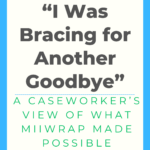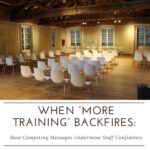MiiWrap is an evolved version of Wraparound, where Motivational Interviewing informs every interaction. Wraparound works, until it doesn’t. Lack of engagement in the process, motivation to making needed behavior change, and lack of tools and skills for staff faced with these problems, limit the success of Wraparound in many cases. The field of Motivational Interviewing directly addresses these challenges. MiiWrap (Motivational Interviewing Informed Wraparound) brings the two together. The result? Improved engagement, improved motivation, better staff and family experience, and long-lasting change. This blog details some of the key differences between Wraparound and MiiWrap.
The MiiWrap mindset sets up staff and families for success from the beginning
Wraparound offers a set of ten principles to interact with families. The logic model, or theory of change, from national initiatives suggests that following these principles will lead to best outcomes. However, these principles aren’t one size fits all, and in some families and situations they are contradictory. There is no guidance on what to do in these situations.
In direct response to this, MiiWrap operates under a unified mindset and theory of change. The MiiWrap mindset guides the approach and each interactions of staff with families. It fuels stronger family engagement, increased motivation, and creates the collaborative partnership that is integral to success. The theory of change details that the overarching goal of MiiWrap is based on meeting three fundamental psychological needs of the family. A focus on supporting autonomy, competence, and inter-relatedness provides a much clearer guide for staff and team roles in supporting sustainable outcomes for youth and families than a set of sometimes competing principles.
The MiiWrap mindset and theory of change work together to clearly guide staff in how to support these basic psychological needs. The Mindset describes how staff approach and interact with families to accomplish the theory of change through non-judgmental respect and acceptance. MiiWrap staff understand the privilege of being asked to share in the family’s journey to improve their lives. And they express genuine curiosity to develop a deeper understanding and empathy for the family’s situation, their perception of their current situation, and their goals and dreams.
At the basis of these interactions is the knowledge that the MiiWrap process is, at its heart, a collaborative partnership. This collaborative partnership respects the family as an expert on their lives. It directly addresses the basic psychological needs of autonomy and competence. Further, the collaborative partnership positions the staff in the guiding role, not the leading role. Staff guide a family through the process, they don’t set the pace or agenda for a family to follow. Placing the family securely in the leading position minimizes resistance and leads to lasting change. The collaborative partnership sets the stage for the whole team, defining team-supported roles that result in effective inter-relatedness and provide the family with many additional sources of support.
MiiWrap teaches skills to effectively implement the stages of Wraparound
Wraparound provides a series of phases and activities, broken down into action steps. The action steps provide a guide for the process, but they don’t help develop focus or fully inform implementation support and management.
During development of MiiWrap, it became obvious that the phases, activities, and action steps needed to be redefined to better support the MiiWrap mindset. This shift of focus, to addressing the mindset first and the steps second, allows staff to optionally implement some steps, and change the order of others. The MiiWrap process is about supporting the family in the way that suits them, and the steps should allow individuation that realizes this.
In addition to refining the phases, activities, and action steps, MiiWrap teaches staff specific interactional skills. These skills directly improve engagement, the collaborative partnership and motivation. The Relational skills are highly effective and specific interactional skills to strengthen engagement and build rapport and the collaborative partnership. These skills are often hard to master, but once done they significantly change the tone, responsiveness, and engagement with families. Identified by the acronym SOARS, these skills build off Motivational Interviewing. Staff learn to seek collaboration, ask open-ended questions, provide affirmations, and use reflections and summary reflections. These skills encourage the family to talk more and explore their own topics instead of being led by an expert. This fosters the collaborative partnership and supports the family in examining strengths and reasons for change.
Learning skills to meet resistance and foster change
Many youth and families who are referred to MiiWrap are not prepared and committed to make the changes needed to achieve the visions they set for their lives. When a family is at an early stage of readiness to change, moving too quickly to planning for change is often met with resistance and is unsuccessful. MiiWrap teaches staff to recognize the current stage of readiness to change. And when families are at early stages of change, staff learn to elicit reasons for not wanting to change. Listening for and respecting this ambivalence to change encourages families to explore their reasons for resistance to change, which often illuminates the opposite: reasons to change.
Successfully guiding families who were resistant to engagement and change is possibly the most profound advantage of MiiWrap over Wraparound.
MiiWrap identified common traps that staff fall into
Knowing what to do can make a huge difference in success for many staff. Learning what not to do can be as important as knowing what to do. MiiWrap teaches staff how to avoid common traps that can hamper motivation and engagement. People work in human services to help people and when they see an “obvious” solution to a problem they want to offer it. But MiiWrap relies on building and sustaining the collaborative partnership. Offering solutions or even asking a series of questions to “problem solve” a situation without family control of the conversation positions the staff in the role of the expert, not a partner. This reduces family autonomy and feeling of competence. It is a hard lesson for many staff but makes an amazing difference when avoided. This can be one of the hardest traps to avoid.
Wraparound is about team support for families, with a large focus on the operation of the team. But Wraparound action steps and fidelity measures set some counterproductive requirements for team members. MiiWrap recognizes that lasting change comes from within the family and teaches staff specific skills to better support them. As in Wraparound, MiiWrap recognizes that people do better when they are supported by other people. But unlike Wraparound, all of the focus remains on the family and supporting their change process, and supports from the team are defined by the family. Families are more engaged and motivated through MiiWrap, which leads to higher satisfaction of team members. And more flexible roles mean team members feel more productive and are more committed to the process.




Comments